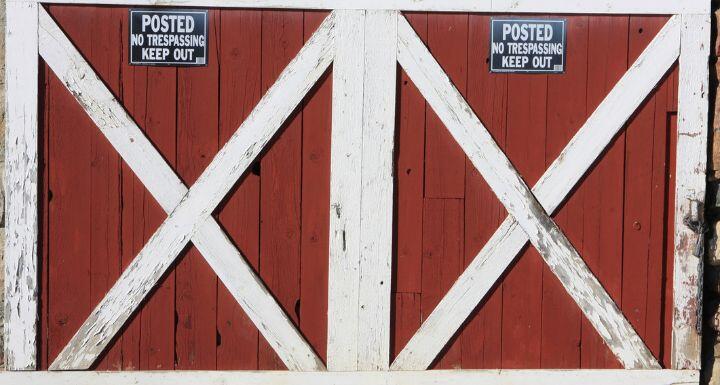Discovering unauthorized persons on your farm is a growing problem.
Such unauthorized entry could include media news teams filming farm operations, environmental activists seeking to identify violations of various water quality or waste management rules, animal rights advocates attempting to observe or document livestock conditions inside your operation, protesters opposed to the construction or operation of livestock farms, or simply curiosity seekers trying to view a farming operation up close. Intruders may range from self-appointed "river keepers" or foreign media looking for a hot story about American farming or livestock operations to a cheapskate looking to dump garbage or trash without paying required fees. No matter the reason, whether harmless in purpose or not, there are bio-security reasons for preventing unauthorized entry onto a farm, regulatory enforcement, and public relations reasons for not allowing someone to gather information from your operation without your permission. Understanding the risk of an uninvited person and preparing for your reaction is essential for a farm owner.
Although they might fit your definition of an unwelcomed person, under the law, not every unknown person found on your farm will necessarily be a "trespasser." In order to determine whether you are dealing with a trespasser, you need to determine whether the person has permission or an inherent right to come onto your property. Sometimes, even if you haven't given express permission, a stranger may have implied permission (for example, a delivery truck driver) or might have simply wandered onto your farm by mistake (for example, a lost or inexperienced hunter). In these instances, the intruder may be unwelcome by you, but would not necessarily qualify as a "trespasser" in the eyes of the law.
Types of Trespass
Civil Trespass
It is important to distinguish between civil and criminal trespass. Civil trespass derives from the "common law" developed from court decisions. If your farm is harmed in some way due to civil trespass, the outcome will likely involve a lawsuit for the payment of damages to you as the farm owner or an injunction prohibiting the trespasser from returning to your farm without your express permission.
There are many examples of civil trespass, such as sneaking onto someone's property to spy on them, openly entering someone's property to protest or demonstrate, or constructing or placing a building or other structure or thing on someone else's property. Some are classified as continuing (i.e., permanent), while others are considered as recurring (i.e., intermittent). If the trespass is malicious in nature (for example, to damage your property or shut down your operations), a court hearing a civil trespass action may impose both compensatory and punitive damages on the offender, and the trespasser still will be subject to prosecution for criminal trespass.
Criminal Trespass
Criminal trespass is a statutory offense under North Carolina law and involves either a First Degree Trespass or Second Degree Trespass. See Article 22B of Chapter 14 of the North Carolina General Statutes. With respect to criminal trespass, a person commits the offense of Second Degree Trespass when the person enters or remains on any of the following:
- The premises of another after the person has been notified not to enter or remain on the property by the owner, a person in charge of the property, a lawful occupant, or another authorized person.
- Premises that are posted, in a manner reasonably likely to come to the attention of intruders, with notice not to enter the property.
- And beginning on December 1, 2023, the curtilage of a dwelling of another between the hours of midnight and 6:00 A.M.
So, for example, if an intruder is discovered and told by you, your operator, or another authorized person to leave your farm but fails to do so, the intruder would be guilty of a Second Degree Trespass. Furthermore, if your farm is posted with signs that sufficiently notify persons not to enter it (for example, "No Trespassing," "No Unauthorized Persons," or "Posted Keep Out"), the intruder also would be guilty of a Second Degree Trespass. A Second Degree Trespass is a Class 3 misdemeanor, the punishment for which is a fine of up to $200.00 and imprisonment for up to 20 days. If an intruder is within the curtilage of a dwelling (the area around your house, such as a backyard garden or driveway), between midnight and six in the morning, that intruder would be considered guilty of a Class 2 misdemeanor. The punishment for that intruder would be punished by a fine of up to $1,000 and imprisonment for up to 60 days. N.C. Gen. Stat. §§ 14-159.13, 15A-1340.23.
The other type of criminal trespass is First Degree Trespass. A person commits the offense of First Degree Trespass if the person, without authorization, enters or remains:
- On the property of another that is enclosed or secured so as to demonstrate clearly an intent to keep out intruders; or,
- In a building of another.
If you find an intruder inside one of your barns, silos, storage areas, or nurseries, the intruder would be guilty of First Degree Trespass if otherwise not authorized to be there. That would be especially true if the doors to your facility had signs indicating that no unauthorized personnel are allowed. A First Degree Trespass is a Class 2 Misdemeanor, the punishment for which is a fine of up to $1,000.00 and imprisonment for up to 60 days.
Posting of Property
There are no specific requirements for posting your farm property. The key is for the posting to notify an approaching person that entry is not permitted adequately. Thus, your sign may include such wording as "No Trespassing," "No Unauthorized Personnel," "Authorized Persons Only," or other similar forms of notice. Your notice must be clear and displayed in a manner that is readily visible from the perimeter of your farm property. Accordingly, notice signs should be installed at the entrance to your farm and around the entire perimeter at adequate intervals.
For guidance on signs, you can look to the provisions of the Landowner Protection Act, Session Law 2011-231 ("Act"), adopted in the 2011 Regular Session of the General Assembly. While the Act does not apply specifically to farms and deals with posting only to prohibit hunting, fishing, and trapping, compliance with its posting requirements is likely to carry great weight with a court considering whether your posting is sufficient. The Act provides that any notices, signs, or postings shall measure not less than 120 square inches in size and shall be conspicuously posted not more than 200 yards apart, close to and along the boundaries of the posted property. As an alternative to signs, (which are easily subject to theft and vandalism), landowners may also paint a purple stripe on trees or posts that are no more than 100 yards apart. The specific words "No Trespassing" are not required.
Practical Tips to Protect Your Farm
- Instruct all of your farm employees on trespass law and how to respond if an unauthorized person is discovered on your premises.
- Place "Posted No Trespassing" or "Posted No Unauthorized Persons" signs at all entrances to your farm and every 200 yards around the boundary of your farm.
- Place "Posted No Trespassing" or "Posted No Unauthorized Persons" and appropriate bio-security warning signs on the doors of your barns, silos, storage areas, and other buildings.
- Install physical barriers such as gates, fences, hedges, and/or trees at entrances and along your farm's roadside frontage to deter people from walking or driving onto your farm property. Note: if you protect your farm with an electric fence, it would be prudent to post warning signs indicating that the fence is electrified—that will provide extra protection for you in case a trespasser gets injured and files a frivolous lawsuit against you.
- Plant vegetative screens to block the view of fields, lagoons, and farm buildings from the road.
- Install alarms and motion detectors on your buildings.
- Call the sheriff if an intruder refuses to leave, returns to your farm after being told to leave, or threatens you or any of your employees.
- Remember that when a law enforcement officer is called by a landowner alleging trespass, the officer may not want to get involved. Instead, the officer may tell you either that you should "swear out a warrant" or that it is only a civil matter. If you get that type of response, contact the Sheriff and/or the District Attorney directly and ask for assistance. Do not swear out a warrant on trespassers until you consult with an attorney. Individuals who "swear out warrants" often become the targets of malicious prosecution and/or abuse of process lawsuits by the trespassers. These are civil torts and could subject you to punitive damages (allowing the court to punish you by requiring you to pay damages to the trespasser in an amount sufficient to likely prevent you from wanting to repeat the act). Theoretically, the more you are worth, the more the punitive damages are justified if the trespasser sues you and wins. In most instances, it is preferable to file a civil action against the trespasser and seek an injunction and compensatory and punitive damages as appropriate.
- Do not point a gun or brandish any weapon at trespassers, as this could lead to violence, and also provide the trespasser with "ammunition" for a punitive damages claim in court. Similarly, do not provoke a fight, threaten reprisals, or use profanity. Remember, activists who may want to challenge your farm operations or an aspect of it (be that use of chemicals, livestock operations, or clean water procedures) are seeking confrontation and may be accompanied by the news media who love nothing more than a show of emotion when the camera is rolling. If individuals persist in remaining on or returning to your farm, it is best to call law enforcement and let them deal with the trespassers.
Conclusion
Trespass law in North Carolina is not overly-complicated, but being familiar with the law, understanding how practically to protect yourself against trespassers, and knowing how to respond when you discover trespassers will go a long way in ensuring the smooth operation of your farm.








